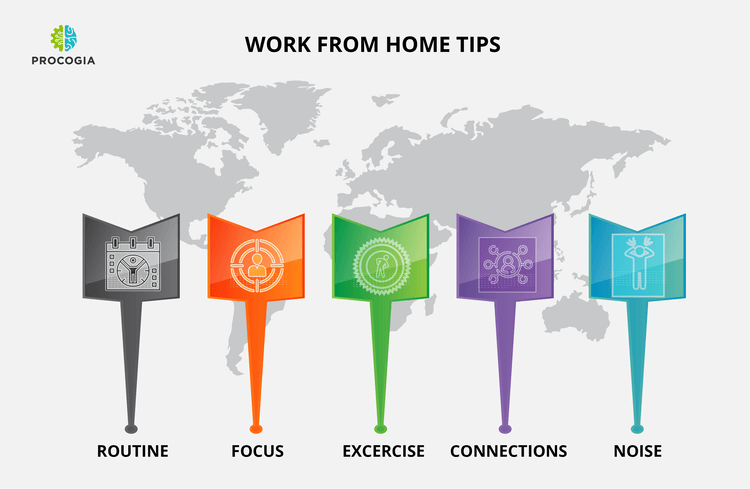In the recent days of COVID-19 and population lockdowns, there has been much information in the media surrounding personal safety, economics and public health. In these times of social segregation, ambiguity, and apprehension, it is especially important for people to take care of their mental health. In this blog post we will discuss some of the mental stressors associated with working from home and we offer some tips on how to survive and thrive under these circumstances:
1. Routine
Right now a lot of people don’t need to commute to/from work. For many of us our morning and evening routines have been completely disrupted. Having some certainty in an otherwise uncertain environment can help provide structure to your day and can help calm nerves. Planning and organization are important skills to have, both personally and professionally. If you find that you are now less productive in the mornings when working from home, or perhaps you now find it difficult to switch off after work hours, you should try to establish a new daily routine. Within the confines of you home (and with most restaurants closed), one great substitute for your morning and evening commute is dedicating more time to preparing your morning and evening meals. The benefit is twofold, not just in routine but in nutrition also.
2. Focus
There is always something noisy on the news, especially when we are all looking for that miracle cure to COVID-19, but there will always be things that you can’t control in life. In a work-from-home situation, people get a good opportunity to practice these skills. Try to be zoned in on tasks at hand. It’s easy to get paralyzed by the feeling of helplessness in this situation, so just focus on what you can control. The ‘Pomodoro Technique’ is a classic methodology for structuring work and propagating focus. The key concept is to use a timer to structure your work and focus on one task for the duration of the timer. Defined tasks within finite time-constraints can make it easier to maintain focus. Regular short breaks are important, so you can always scratch distraction’s proverbial itch during your next break.
3. Exercise
Step out of the house (assuming that you are allowed and it is safe to do so). Even just 10 minutes every day will do wonders for your mental state. If you can’t go outside, you’ll find plenty of ways to exercise within the confines of your own home with a quick google search. A healthy body is a healthy mind. If you see a big difference now when you walk for 10 mins a day, challenge yourself to take exercise more seriously going forward. The Mayo Clinic recommends at least 150 minutes of moderate aerobic activity or 75 minutes of vigorous aerobic activity a week.
4. Connections
We all rely on our connections but in these times it’s easy to just fall into hibernation. We need a real, human connection to ground us, so overcommunicate if you need to. Video meetings can be more challenging than a regular meeting, but in our increasingly globalized world it’s a good skill to have. You’ll never have a better time opportunity to practice these skills as intensely. At ProCogia we host weekly internal ‘tech talks’; video-conference presentations on a wide variety of themes. In the past week, we have expanded to virtual coffee breaks also. These serve an important function in structuring weekly interactions outside of our team standups/meetings, where all teams can interact in a less-formal setting.
5. Noise
Turn off your phone, notifications, WhatsApp channels, Facebook and all the other streams of bad information. You can set a dedicated time in the day to consume all of it. Believe me, you’re not missing anything. Some browsing is fine. But limit the duration and try to do it during a fixed time during the day if possible. Try to frame these challenges as opportunities for broader professional development. Many of the things you find particularly difficult now are normal professional challenges that are amplified when working from home, but will still be important skills to have when you return to your normal office. With a lot of the world working remotely right now, people may never get as good of an opportunity/laboratory to work on these skills. Every obstacle provides an opportunity. 




